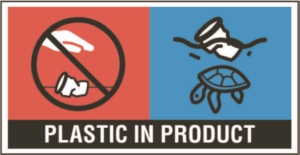EU approves final marking requirements for beverage cups.
The Commission proposal to introduce marking requirements for beverage cups under the EU Single Use Plastics Directive (SUPD) has been approved.
As reported previously, the Commission – already six months late with the rules – means that plastic and plastic containing (i.e. paper) beverage cups will be required to have markings placed on them after 3 July 2021.
Before the approval, the EVA joined with other likeminded organisations in Brussels to stress a range of concerns with the markings, in particular the impracticalities of the July 2021 implementation, a barrier to the single market and unclear rules with regards to stocks. Our letters went to the highest level of the EU Commission and we managed a joint meeting call with the responsible Commission officials.
E.g. Marking for paper cups (printed)

France: National implementation of EU Single Use Plastics Directive.
In France a new Decree was published on 31 December stipulating that plastic cups used as packaging and made entirely of plastic will be banned from being placed on the market from 3 July 2021 with no possibility to dispose of stocks.
As of 3 July 2021, certain cups made partly of plastic (i.e. paper cups) will be allowed to be placed on the market provided that they meet a defined level of plastic content. This maximum authorised plastic content of the cups is to be defined shortly in a ministerial order.
The French Vending Association (NAVSA) is providing industry input and keenly awaits the ministerial order.
Brexit: EU and UK negotiate a free trade agreement.
Since last January, when the UK officially withdrew from EU membership, both jurisdictions have maintained a transition period where the majority of rules remained the same as before. As you are no doubt aware, the UK and EU announced a free trade agreement on 24 December which came into force (pending ratification) on 1 January this year.
Broadly speaking, the agreement ensures that additional quotas and tariffs will not be introduced on products. However the UK does not have to follow EU rules on product standards, so new checks and paperwork are now required. Furthermore, if significant divergence in certain legislative areas takes place, the agreement does allow tariffs to be introduced.
Due to the Northern Ireland protocol of the Withdrawal Agreement, Northern Ireland stays within the EU Single market for goods and will continue to apply EU Customs rules at its ports. This means that products such as certain foodstuffs will need declarations and checks as they move from one part of the UK to another. This could result in additional bureaucracy for vending operators active (or sourcing products) across the UK. In addition we already know that e.g. the EU Ecodesign and Energy Labelling for refrigerated vending machines will apply in Northern Ireland, but not in the Great Britain (GB) market, where separate legislation is set to be introduced.
EU Farm to Fork Strategy to introduce a Code of Conduct for businesses.
In January the EVA provided a response to the EU Commission on a proposed ‘Code of Conduct for Responsible Business and Marketing Practices’ as part of the EU Farm to Fork strategy, which aims to make European food systems world leaders with regards to sustainability.
The Code of Conduct would be signed on a voluntary basis by the end of June 2021 and would require signees to introduce commitments e.g. to improve the food environment.
Consultation launched on EU Nutritional Labelling scheme.
The EU Commission has published a roadmap (a legislative plan) for consultation for the introduction of an EU-wide front of pack nutritional labelling scheme.
The Commission is considering a number of possibilities as a basis such as theNutriscore A-E label or the Nutrinform Battery.
The EVA responded to the consultation at the end of January -, with the required legislation currently planned for the end of 2022.
The post Hot issues for vending – February 2020 appeared first on European Vending and Coffee Service Association (EVA).
Mehr Infos zu ####post_title#### unter: https://www.vending-europe.eu/hot-issues-for-vending-february-2020-2/
Weitere Infos zu Kaffeeautomaten, Getränkeautomaten, Snackautomaten, Warenautomaten und Vendingautomaten unter https://www.dhuenn.com – Automaten Köln

Neueste Kommentare